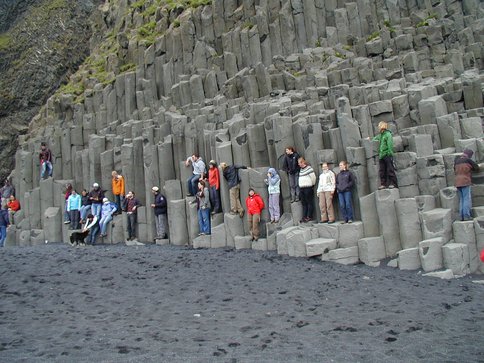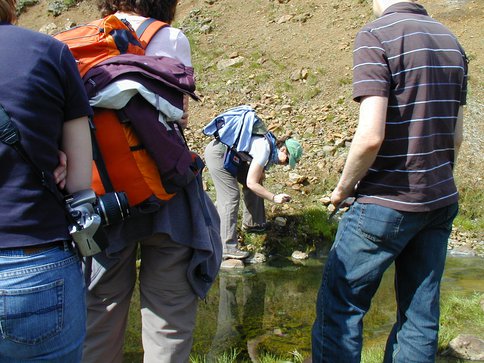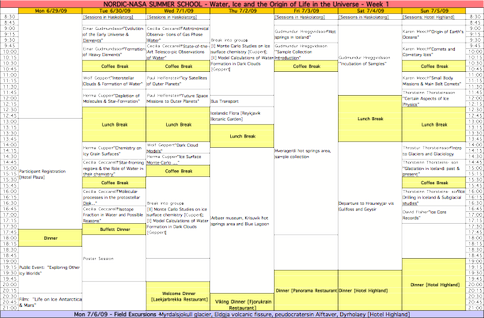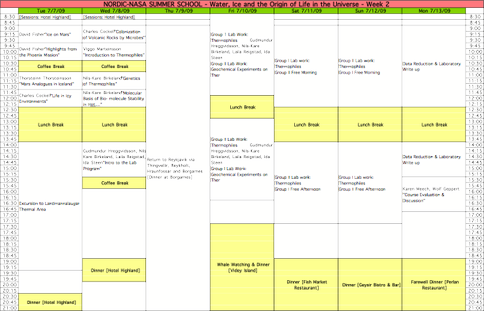2009 Annual Science Report
 University of Hawaii, Manoa
Reporting | JUL 2008 – AUG 2009
University of Hawaii, Manoa
Reporting | JUL 2008 – AUG 2009
Nordic-UHNAI Astrobiology Summer School - Iceland 2009
Project Summary
In collaboration with the Nordic Astrobiology Network, we organized an astrobiology summer school held in Iceland from Jun 29-Jul 13, 2009. Participants included 19 graduate students from the US, and 24 students from 16 countries, with a focus on Nordic participants. Activities during the two week program included lectures on the topics of Water, Ice and the Origin of Life in the Universe, a student poster session, field sampling on thermophiles, and labwork and computer modeling activities.
Project Progress
A fundamental aspect of astrobiology is its cross-disciplinary nature. The network of Astrobiology Institutes is successfully creating an environment in which researchers from widely different backgrounds can interact and break down the barriers between subjects erected during their different paths of training. However, if astrobiology is going to be an increasingly vibrant discipline, we must prepare the young researchers who, a generation from now, will be leading the future efforts. In order to accomplish this and start to build interdisciplinary skills, we held a graduate astrobiology summer school from June 29-July 13 in Reykjavik Iceland in collaboration with the Nordic Astrobiology Network. There were 43 graduate participants, 19 students from the US and the remaining 24 students represented 16 countries. The theme of Water, Ice and the Origin of Life in the Universe, encompassed topics on star formation and interstellar chemistry, observations of water in space and on solar system bodies, ice physics in small solar system bodies and on earth, origin of Earth’s oceans, and extremophiles in icy geothermal environments. The first half of the workshop mixed lectures, poster sessions, monto carlo studies of ice surface chemistry (computer simulations) with geological excursions in the vicinity of Reykjavik, including a full day sampling at the Hveragerdi hot springs area. Prior to moving the school to the base of the Icelandic Highlands, students engaged in labwork to incubate the samples that were collected in Hveragerdi. Sessions continued for 4 days at the Highland Hotel, near the Myrdalsjokull glacier, which was a convenient base for glacial and volcanic environment explorations for geochemical field sample collection. After return to Reykjavik the students spend 3.5 days with hands on experimental lab work on thermophiles and writing up their projects. In addition, interspersed in the program were significant opportunities to learn about Icelandic culture and history.
The quality of the applicant pool was excellent; we received 150 applications. In a post-workshop evaluation, the participants found that the workshop organization was superb, although they would have appreciated a bit more unstructured time, as this is an important part of developing the networks for the future. Additionally, while the presentations were found to be high quality, future workshops need to take care to allow for longer discussion periods for each of the presentations. The connection between the hands on activities, field work and the workshop lectures was excellent, and the mix of activities was found to be very valuable.
Participants in a group photo while exploring basalt columns in S. Iceland.
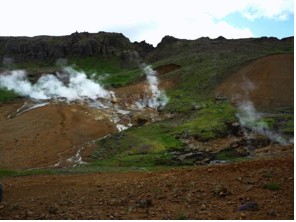
Geothermal site at Hveragerdi, southeast of Reykjavik. Samples were collected here for incubation and analysis.
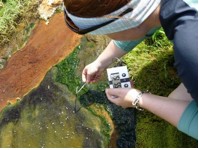
UH Nordic summer student checking the pH of sample site.
Students collecting biological samples in hot springs.
Summer School Schedule 1. Nordic-UH summer school schedule – week 1.
Summer School Schedule 2. Nordic-UH Summer School schedule – week 2.
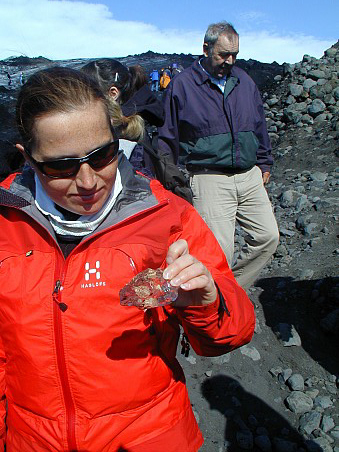
Student examining a single glacial ice crystal during excursion on the Myrdasjokull glacier, Iceland.
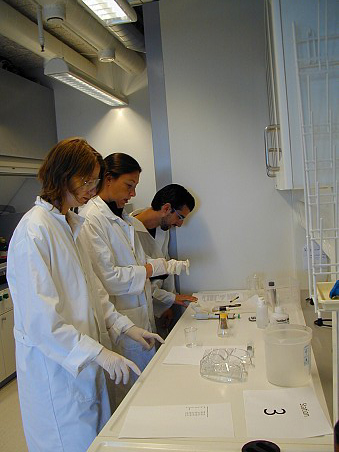
Geochemical analysis of hot springs water at the University of Iceland
-
PROJECT INVESTIGATORS:
-
PROJECT MEMBERS:
Wolf Geppert
Co-Investigator
Karen Meech
Co-Investigator
-
RELATED OBJECTIVES:
Objective 2.2
Outer Solar System exploration
Objective 3.1
Sources of prebiotic materials and catalysts
Objective 5.2
Co-evolution of microbial communities
Objective 5.3
Biochemical adaptation to extreme environments
